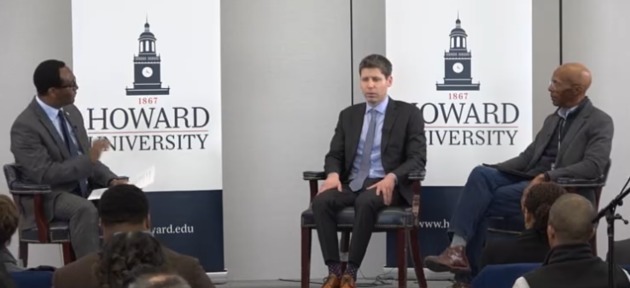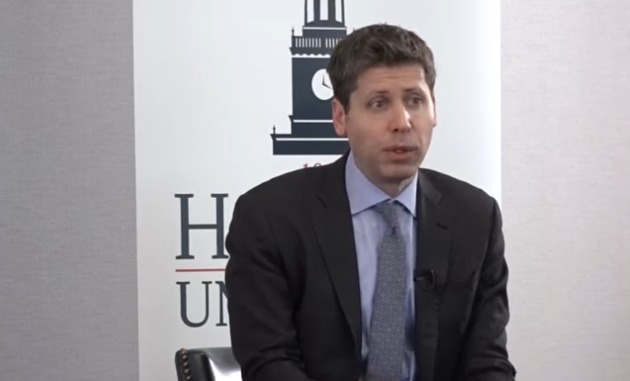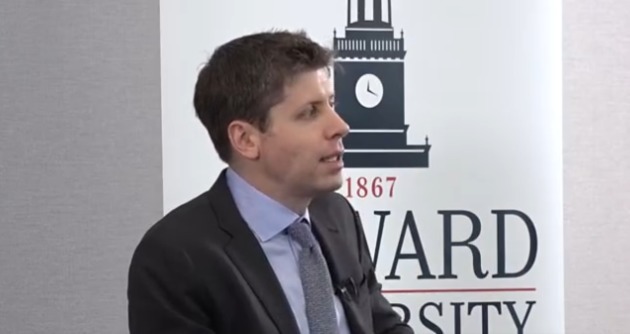On April 9th, Sam Altman, the CEO of OpenAI, had a conversation about artificial intelligence with Dr. Ben Vinson III, the president of Howard University.
In the conversation, Altman not only demonstrated profound insights into the future development of artificial intelligence, but also emphasized his focus on technology ethics, social responsibility, and collaboration.

Photo/Arizona PBS website video screenshot
Key Takeaways
1. Artificial intelligence can be the greatest technological revolution, the greatest new tool, the greatest engine for economic growth the world has had.
2. To get deployed well, it will take the partnership and integration with all of society and making sure that this is done in an equitable way, that lifts everybody up.
3. We have new teams that help us think about being prepared for that world. Also, technical safety work, to think about how we can make sure humans stay in control of systems that are more capable than we are.
4. But now, we're at the even harder question. Which is, who decides what the behavior of these systems should be?
5. I think this is probably the greatest time, um, at least since the internet, to be graduating, to be, you know, a young person, if you're interested in entering the technology industry, this is a very special opportunity.
6. And, you know, that's when the advantage accrues to people who are just starting out, uh, or earlier on.
7. You all are way more familiar with AI tools than people older than you. You bring a new set of fresh perspectives about, not only, how to do existing things, but how to -- what can be created now, what just wasn't possible before this.
8. I think human adaptability is remarkable.
9. So, we make the thing as good as we know how to do, with as much input as we have at the time, and as much kind of compute and data resources we have at the time, we build something, we put it out.
10. I think critical thinking, creativity, the ability to figure out what other people want, the ability to have new ideas, that, in some sense that'll be the most valuable skill of the future.
The dialogue between Sam Altman and Howard University President Ben Vinson III, Ph.D., covered multiple key topics regarding the development of artificial intelligence. Here is a detailed summary of the conversation:
Ethical Considerations and Social Responsibility of Artificial Intelligence
In a discussion, Dr. Ben Vinson III emphasized the importance of ethical considerations in the rapid development of artificial intelligence. Altman responded that AI does have the potential to be a powerful engine for economic growth, but this requires collaboration from all of society to ensure that the technology is deployed in a fair way that benefits everyone. He stressed that OpenAI is seeking answers to achieve this goal, venturing outside of Silicon Valley to engage with people from different backgrounds and industries to ensure that products like ChatGPT can serve a broader audience and do so in an inclusive and equitable manner.
Altman further discussed the issue of AI bias, noting that early versions of GPT may have been affected by data biases on the internet. To address this, OpenAI has employed methods such as "reinforcement learning based on human feedback," which, while not claiming to completely eliminate bias, have significantly improved the system's behavior. He pointed out that GPT-4 has shown significant progress in bias testing, but also faces new challenges, namely how to decide what these systems' behavior should be and ensure that marginalized voices are heard.
Artificial Intelligence Diversity and Inclusion
Dr. William Sutherland highlights the importance of marginalized voices in the development of artificial intelligence. Altman believes that it is crucial to ensure a representative sample, whether in the proposal of engineering ideas, the development of system behavior norms, or in providing human feedback. He emphasizes that OpenAI is very welcoming to talents from diverse backgrounds, as they bring new perspectives and creativity, which is of great help in promoting technological revolution and solving bias problems.

Photo/Arizona PBS website video screenshot
Altman also mentioned that OpenAI is working to ensure that the benefits of the technological revolution can be equally shared by students from disadvantaged backgrounds. He believes that this technological revolution provides unprecedented opportunities for young people, who are more familiar with AI tools than older people and are able to create things that were not possible before. He encourages young people to seize this special era and use AI tools to drive change.
Impact of Artificial Intelligence on Education
In the dialogue, Altman expressed his excitement about the application of artificial intelligence in the field of education. He mentioned that students and teachers are early users of ChatGPT, and the way they use ChatGPT and the results they achieve have surprised OpenAI. He envisions a future where every student has a personalized AI tutor, which will revolutionize the way they learn. Altman believes that while human teachers are still indispensable, the addition of AI can amplify the impact of teachers and improve the quality of education.

Photo/Arizona PBS website video screenshot
He also mentioned some of OpenAI's attempts in the field of education, such as the launch of some GPT products, which he believes are very good educational experiences. He hopes that in the future, it will be possible to achieve a world where even college students can be smarter than today's students, thanks to the help of AI tools.
The Future and Challenges of Artificial Intelligence
Altman also discussed the challenges that artificial intelligence may face in the future, especially the issue of AGI (artificial general intelligence). He believes that AGI is a vague term, but he is more concerned with superintelligence, which is AI that can do AI research. He mentioned that OpenAI is setting up new teams to think about how to prepare for that world and ensure that humans can maintain control of AI systems.
Altman also mentioned the work on technology security, thinking about how to ensure that humans maintain control over systems that are more capable than ever before. He believes that while humans will still be in charge of everything, what any one person or group can do will be greatly increased. He emphasized the importance of starting this global conversation so that we can collectively decide how to balance risks and benefits.
Altman also mentioned the most valuable skills for the future, which he believes will to some extent be critical thinking, creativity, the ability to understand the needs of others, and the ability to generate new ideas. He believes that the ability to learn to create, the ability to generate new ideas, and the ability to choose ideas from the many options presented by AI will be very valuable. He agreed that tools will change, but also believes that it is very important to be familiar with these tools today, and with this new way of using computers.
Through this dialogue, we can see Altman's deep insights into the future development of artificial intelligence, as well as his emphasis on technology ethics, social responsibility and cooperation. He emphasizes the importance of diversity and inclusion in AI development, and provides insights into the impact and challenges of future education. These discussions not only provide us with insights into the future development of artificial intelligence, but also provide valuable guidance on how we can make progress in this field.


 川公网安备 51019002001991号
川公网安备 51019002001991号





